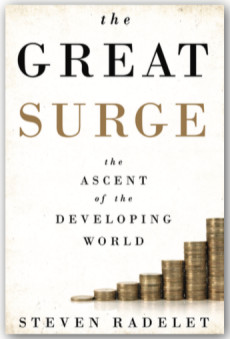
The Great Surge: The Ascent of the Developing World
Steven Radelet
354 pages, Simon & Schuster, 2015
In debates and campaign events, some presidential candidates describe the United States as a country that has failed to lead. To hear them tell it, success has eluded US policymakers, and the nation is buffeted by events in a world shaped by actors who neither embrace US values nor share US goals. But as Georgetown University development economist Steven Radelet argues in his book The Great Surge, this “pervasive pessimism” is unwarranted. After all, growing numbers of countries have adopted the US model of democracy and market economy—not only in Europe, but in Asia, Africa, and Latin America. And although its benefits have not always been equitably shared, the model has lifted millions out of poverty.
Radelet documents in head-spinning detail the impact of these gains in 109 developing countries. “Never before have so many people, in so many developing countries, made so much progress in so short a time in reducing poverty, increasing incomes, improving health, reducing conflict and war, and spreading democracy,” he writes.
Although Radelet does not dwell on the United States’ role in the rise of the developing world, US leadership was pivotal in helping launch the transformations he describes. At Bretton Woods in 1944, US policymakers put forth a vision that laid the groundwork for international economic integration and aid distribution and established the International Monetary Fund and the World Bank. In 1948, the Marshall Plan, an American initiative that rebuilt war-ravaged Western Europe, began to integrate friends and former foes into a larger economic and political order.
The World Bank was joined in subsequent years by regional development banks—the Inter-American Development Bank in 1959, the African Development Bank in 1964, and the Asian Development Bank in 1966. Negotiations that included the majority of developing countries created the World Trade Organization in 1994. As Radelet outlines, this process of economic integration has recently accelerated, thanks to investments in information technology by the US government and private actors as well as regional agreements to liberalize trade, promote foreign investment, and reward good governance.
Two other developments, Radelet notes, greatly contributed to this progress: the fall of Soviet communism and the emergence of accountable local leaders as the influence of communism and colonialism waned. During prior periods of globalization, many countries were “caught up in the power struggles, ideological battles, and physical conflicts of the Cold War.” To counter Soviet influence, the United States often acted against its democratic values by supporting right-wing dictatorships. After the Cold War’s end, by contrast, “dictators supported by the superpowers began to fall. Civil wars and state violence began to decline. … A consensus began to emerge around more market-based economic systems and more accountable, transparent, and democratic governance.”
In the years that followed, leaders in the United States, Europe, and Japan pursued purposeful, albeit imperfect, policies aimed at engaging and lifting up developing economies. Leaders in Africa, Asia, and Latin America lowered barriers to trade and investment and connected local enterprises to global markets. At the same time, as Radelet details, charitable foundations and NGOs joined forces with governments and businesses to bring technological benefits to the world’s poor, from mobile health and banking services to online education to more transparent governance. Radelet makes special mention of partnerships like the Global Alliance for Vaccines and Immunization and the Global Fund to Fight AIDs, Tuberculosis and Malaria, which have successfully leveraged public funding, private-sector R&D capacity, and a needed nudge from the charitable sector.
Radelet believes that knowledge gained from such programs can contribute greatly to states’ capacity to improve their citizens’ welfare in the future. But he warns that failure to address the interplay among political, economic, environmental, and demographic “headwinds” can reverse these gains. Corruption, violent conflict, and climate change threaten to derail progress. And, absent smart policy, the very forces that have enabled the great surge—technological innovation and economic integration—could undermine the ability of states to govern, societies to prosper, and nature to provide.
Largely unexamined in Radelet’s otherwise exhaustive account is the most dire of the global threats: the contagion of state failure and the unraveling of a state system Americans and others have worked hard to build. This is a serious omission, as accountable states are the primary guarantors of human security, and their failure could undo the gains that Radelet applauds. In the face of these threats, the United States has a central role to play in maintaining the system of democracy and open markets that it helped create. So as the next US president prepares for the choices ahead, he or she ought to take time to gain a fuller understanding of the values that inform and interests that drive global development policy. The Great Surge is a great place to start.

